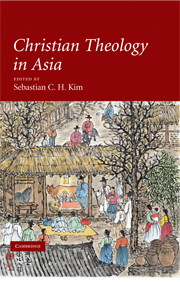Book contents
- Frontmatter
- Contents
- Contributors
- Preface and Acknowledgements
- 1 FORMATION OF CHRISTIAN THEOLOGIES IN ASIA
- II THEOLOGICAL THEMES OF CHRISTIANITY IN ASIA
- 8 Religious pluralism, dialogue and Asian Christian responses
- 9 Cross-textual hermeneutics and identity in multi-scriptural Asia
- 10 Re-constructing Asian feminist theology: toward a glocal feminist theology in an era of neo-Empire(s)
- 11 The ecumenical movement in Asia in the context of Asian socio-political realities
- 12 Mission and evangelism: evangelical and pentecostal theologies in Asia
- 13 Subalterns, identity politics and Christian theology in India
- Index
- References
10 - Re-constructing Asian feminist theology: toward a glocal feminist theology in an era of neo-Empire(s)
Published online by Cambridge University Press: 05 June 2012
- Frontmatter
- Contents
- Contributors
- Preface and Acknowledgements
- 1 FORMATION OF CHRISTIAN THEOLOGIES IN ASIA
- II THEOLOGICAL THEMES OF CHRISTIANITY IN ASIA
- 8 Religious pluralism, dialogue and Asian Christian responses
- 9 Cross-textual hermeneutics and identity in multi-scriptural Asia
- 10 Re-constructing Asian feminist theology: toward a glocal feminist theology in an era of neo-Empire(s)
- 11 The ecumenical movement in Asia in the context of Asian socio-political realities
- 12 Mission and evangelism: evangelical and pentecostal theologies in Asia
- 13 Subalterns, identity politics and Christian theology in India
- Index
- References
Summary
Feminism is a major philosophical, political, social and religious movement which requires a profound intellectual conversion … It calls for a redefinition of power and authority and for a redistribution of power.
Kaye AsheTo make the liberated voice, one must confront the issue of audience – we must know to whom we speak … When I thought about audience–the way in which the language we choose to use declares who it is we place at the center of our discourse – I confronted my fear of placing myself and other black women at the speaking center.
bell hooksPROBLEMATIZING ‘ASIAN-WOMEN’
Asian feminist theology, like any other theology, is always in the making. The history of Asian theological engagement with feminism is in short supply and has not been explored in great detail in the various disciplines of theology over the last few decades. Asian feminist theology has emerged in the context of an ecumenical movement. Theologically trained women raised the issue of the invisibility of women in the Asian ecumenical movement and its institutions. While western feminist theological discourse was developed by individuals with a theological and biblical critique of the sexist and patriarchal system both in theology and the church, Asian feminist theology did not raise a theological agenda per se at the beginning of its development. The main issues were bringing women out from invisibility to visibility in ecumenical organizations such as the CCA (Christian Conference of Asia).
- Type
- Chapter
- Information
- Christian Theology in Asia , pp. 205 - 226Publisher: Cambridge University PressPrint publication year: 2008
References
- 1
- Cited by



